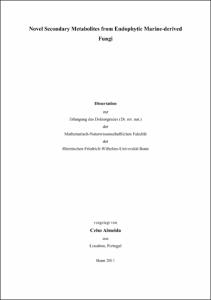Almeida, Celso: Novel Secondary Metabolites from Endophytic Marine-derived Fungi. - Bonn, 2011. - Dissertation, Rheinische Friedrich-Wilhelms-Universität Bonn.
Online-Ausgabe in bonndoc: https://nbn-resolving.org/urn:nbn:de:hbz:5N-24343
Online-Ausgabe in bonndoc: https://nbn-resolving.org/urn:nbn:de:hbz:5N-24343
@phdthesis{handle:20.500.11811/4933,
urn: https://nbn-resolving.org/urn:nbn:de:hbz:5N-24343,
author = {{Celso Almeida}},
title = {Novel Secondary Metabolites from Endophytic Marine-derived Fungi},
school = {Rheinische Friedrich-Wilhelms-Universität Bonn},
year = 2011,
month = feb,
note = {The marine environment is distinguished by unique groups of organisms being the source of a wide array of fascinating structures. Marine microorganisms, such as fungi often occur associated with macroorganisms like algae, sponges or tunicates and produce secondary metabolites with novel structures and potential pharmaceutical significance. The goal of this study was the evaluation of new natural products of marine-derived fungi in order to find novel lead structures for drug development. To achieve this aim seven fungal strains living associated with marine algae and sponges were cultivated during 40 to 60 days, and the extracts tested for bioactivity. Subsequently, the natural products were isolated, their structures determined and their bioactivity established.
From algicolous and sponge-derived fungi, 35 new secondary metabolites were isolated, 14 of which display unprecedented carbon skeletons implying unknown biosynthetic reactions in fungi. All pure compounds were subjected to an extensive panel of bioactivity tests, in a total of around 850 individual biological activity assays against 111 bioactivity targets, from which antiproliferative, antiplasmodial and protease inhibitory properties, as well as affinity to receptors involved in psychoactive activity could be attributed.},
url = {https://hdl.handle.net/20.500.11811/4933}
}
urn: https://nbn-resolving.org/urn:nbn:de:hbz:5N-24343,
author = {{Celso Almeida}},
title = {Novel Secondary Metabolites from Endophytic Marine-derived Fungi},
school = {Rheinische Friedrich-Wilhelms-Universität Bonn},
year = 2011,
month = feb,
note = {The marine environment is distinguished by unique groups of organisms being the source of a wide array of fascinating structures. Marine microorganisms, such as fungi often occur associated with macroorganisms like algae, sponges or tunicates and produce secondary metabolites with novel structures and potential pharmaceutical significance. The goal of this study was the evaluation of new natural products of marine-derived fungi in order to find novel lead structures for drug development. To achieve this aim seven fungal strains living associated with marine algae and sponges were cultivated during 40 to 60 days, and the extracts tested for bioactivity. Subsequently, the natural products were isolated, their structures determined and their bioactivity established.
From algicolous and sponge-derived fungi, 35 new secondary metabolites were isolated, 14 of which display unprecedented carbon skeletons implying unknown biosynthetic reactions in fungi. All pure compounds were subjected to an extensive panel of bioactivity tests, in a total of around 850 individual biological activity assays against 111 bioactivity targets, from which antiproliferative, antiplasmodial and protease inhibitory properties, as well as affinity to receptors involved in psychoactive activity could be attributed.},
url = {https://hdl.handle.net/20.500.11811/4933}
}






